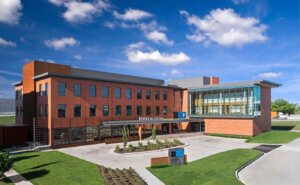August 2, 2024:
The expansion of the Big Ten Conference on August 2 to include four new members creates an opportunity for growth of the Big Ten Cancer Research Consortium (Big Ten CRC). The Big Ten CRC has invited the new members of the athletic conference – the University of California at Los Angeles, the University of Oregon, the University of Southern California, and the University of Washington – to join the Big Ten CRC. Plans to expand the Big Ten CRC are proceeding.
The Big Ten Cancer Research Consortium, established in 2013, combines the cancer centers of the Big Ten Conference to conduct multi-institutional research led by clinical and scientific researchers at member institutions. Together, with support from industry, philanthropic, and other funding sources, Big Ten CRC researchers work to make significant strides against their common opponent: cancer. To date, the Big Ten CRC has more than 550 researchers participating in 18 working groups, more than 1,000 patients have enrolled in studies, 38 studies have opened to accrual, and more than 15,000 samples have been collected for correlative research.
Raymond J. Hohl, chair of the Big Ten CRC Directors Committee and director of the Penn State Cancer Institute, said “I am particularly enthusiastic about the ongoing efforts to expand the consortium to include the new Big Ten institutions. We will foster an environment for the development and running of innovative investigator-initiated studies that match new with seasoned clinical scientists across our member institutions.”
Researchers from Big Ten CRC member institutions meet in Clinical Trial Working Groups to develop and launch collaborative studies. Mentorship is a key component of all Big Ten CRC studies, with early-career faculty and fellows working alongside experienced colleagues. The Big Ten CRC emphasizes the critical role of discoveries in the lab to continually inform and transform clinical practice. For this reason, clinical research studies conducted within the Big Ten CRC include correlative research components to generate new avenues for clinical investigation. Recognizing that the continuum of cancer care involves more than just treatment, Big Ten cancer researchers actively collaborate on population-based studies and nontherapeutic research areas such as survivorship, quality of life, and diversity in clinical trial participation.
“We are eager to team up with clinical and scientific researchers at Big Ten member institutions to attack our common enemy,” said Bob Guldberg, University of Oregon vice president, and Leona DeArmond, executive director of the Phil and Penny Knight Campus for Accelerating Scientific Impact. “The Big Ten Cancer Research Consortium provides powerful opportunities to drive new scientific discoveries, improve the lives of patients, and mentor our trainees to become the research leaders of tomorrow.”
Caryn Lerman, director of USC Norris Comprehensive Cancer Center said, “We are thrilled to join our esteemed colleagues in the Big Ten Cancer Research Consortium. This collaboration will expand access to innovative clinical trials for people with cancer, with the goal of improving outcomes for all patients.”
Learn more about the Big Ten Cancer Research Consortium at bigtencrc.org.















Subscribe to the Big Ten CRC Newsletter X
X Facebook
Facebook YouTube
YouTube